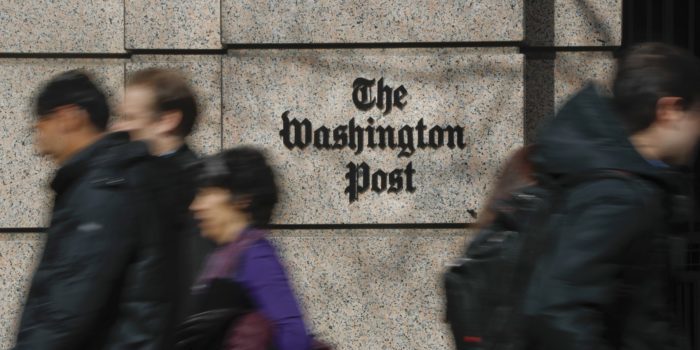(Headline USA) The Washington Post said Friday that newly named editor Robert Winnett had decided not to take the job and remain in Britain instead, another upheaval at a news outlet where a reorganization plan has gone disastrously wrong.
The Post’s CEO and publisher, Will Lewis, announced Winnett’s decision to withdraw in a note to staff on Friday morning, and said a recruitment firm would be hired to launch a search for a replacement immediately.
The financially struggling Post had announced Winnett would take over as editor of the core newsroom functions after November’s presidential election, while it was also setting up a “third newsroom” devoted to finding new ways for its journalism to make money.
Three weeks ago, then-executive editor Sally Buzbee said that she would quit rather than take a demotion to head this revenue-enhancement effort. Former Wall Street Journal editor Matt Murray was brought on as her interim replacement and future leader of the “third newsroom.”
Both the Wall Street Journal and the Daily Telegraph, where Winnett will remain editor, are regarded as conservative-oriented news products that are part of the Rupert Murdoch-owned family of publications under which Fox News also falls.
While the subtext remains largely unspoken, the effort to rehabilitate the Washington Post, long seen as having a leftward bias since the days of the Watergate scandal, but which has grown increasingly far toward the radical fringes under the ownership of Amazon billionaire Jeff Bezos, appeared to have sent the newspaper’s so-called journalists into an apoplectic tizzy, triggering a mini-revolt similar to that seen previously at CNN under the leadership of Chris Licht.
Since then, several published reports had raised questions about the journalistic ethics of Lewis and Winnett stemming from their work in England. For example, both men worked together in a series of scoops about extravagant spending by British politicians fueled by information that they paid a data information company for—a practice frowned upon by American journalists.
That practise, of course, would seem to pale in comparison to the cloak-and-dagger tipoffs that Bob Woodward and Carl Bernstein received from an anonymous source named “Deep Throat”—later identified as top FBI official Mark Felt.
While some migh frown on allowing intelligence officials to plant stories with the utmost political implications, undermining a democratically elected leader and replacing him with a president—Gerald Ford—who was never elected either president or vice president by the people, while using the veil of anonymity to avoid any sort of accountability, those practices have long been lionized and romanticized by leftist media.
The breathless press likewise was far too willing to forgive and forget many of the ethical lapses during the Trump administration that depleted its credibility and led it to its current predicament while carping on the relatively trivial foibles of the British media.
The New York Times wrote that both Winnett and Lewis were involved in stories that appeared to be based on fraudulently-obtained phone and business records, notwithstanding the fact that the Times itself published Trump’s illegally purloined tax records and those of several other wealthy individuals it hoped to discredit.
The lack of self awareness, paired simultaneously with navel-gazing at a publication smitten with the notion of covering its own palace intrigue like it were news, led to an uneasy marriage of comedy and pathos on the pages of the Post.
David Maraniss, a two-time Pulitzer Prize winner who has worked at the newspaper for four decades, whined this week that he didn’t know anyone there who thought the situation with the publisher and “supposed new editor” could stand.
“The body is rejecting the transfusion,” Maraniss wrote on Facebook.
Lewis, a former Wall Street Journal publisher and vice chairman of the Associated Press board of directors, started at the Post earlier this year, hired by Bezos to stem a costly exodus of readers. The Post had said it had lost $77 million last year.
In a memo to key staff members earlier this week, Bezos assured them that journalistic standards and ethics at the newspaper would not change—an ominous pledge given the root cause of the paper’s problems. “I know you’ve already heard this from Will, but I wanted to also weigh in directly,” he wrote.
“To be sure, it can’t be business as usual at The Post,” Bezos wrote. “The world is evolving rapidly and we do need to change as a business.”
In his Facebook note, Maraniss said that the issue for staff members is integrity, not resistance to change. To that end, it remains to be seen whether Lewis can gain staff support.
Lewis said Friday that the recruitment firm and process for replacing Winnett will be announced soon. Winnett’s sudden hiring—without any indication of an extensive search—had also rankled staff members.
But Lewis also said that the reorganization efforts would continue.
Winnett is staying at the Telegraph in London. Telegraph editor Chris Evans told that newspaper that “he’s a talented chap, and their loss is our gain,” according to the Guardian.
Adapted from reporting by the Associated Press

